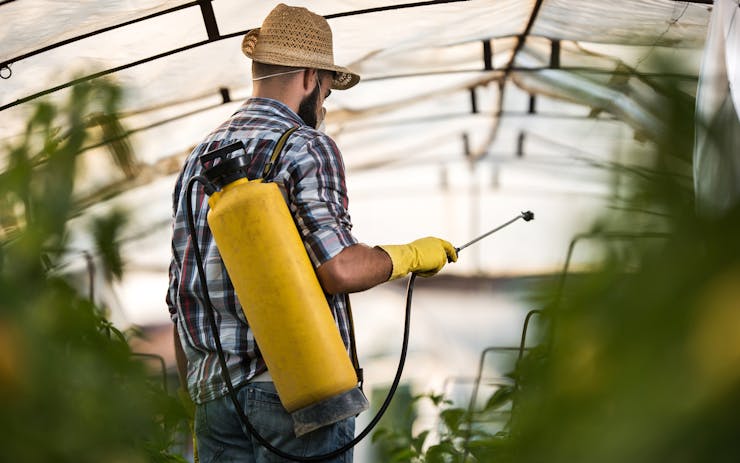In the last days of 2017, most of the national news coverage was devoted to the bone-chilling cold that was sending even the hardiest souls in the Great White North running for cover indoors. But news of a different sort garnered some attention, too.
Prior to 2017, Health Canada wasn’t testing cannabis produced by LPs—the companies were trusted to monitor themselves.
The federal government announced it would fine licensed cannabis producers as much as $1 million per violation for using banned pesticides. It is among several penalties to be enshrined in the Cannabis Act, which is set to legalize recreational cannabis in July.
Health Canada’s response to banned pesticides will be “proportionate to the level of risk posed to the health and safety of Canadians, the degree of cooperation offered, the compliance history, the likelihood of the reoccurrence of the activity, and whether any other non-compliant activities are also observed,” Andre Gagnon, the agency’s media relations officer, told Leafly.
“I think it’s a positive step forward,” a consumer who had suffered health problems after smoking licensed cannabis told The Globe and Mail. “You would think the companies are all going to think twice before they use anything they’re not supposed to.”
The Health Canada announcement capped a 13-month period in which a handful of the licensed companies produced cannabis that was found to be tainted with banned pesticides — a development that forced regulators and producers alike to evaluate and change the way they did business.
In May, Health Canada announced that LPs’ cannabis would be screened for banned pesticides by an independent laboratory before being put on the market.
Ontario-based producer Mettrum announced recalls in November 2016, later confirming suspicion the product had been tainted by myclobutanil—a fungicide that, when burned, produces hydrogen cyanide, which interferes with the way oxygen is used in the body and can cause problems ranging from headaches and nausea to seizures, fainting and even death depending on the amount inhaled. That discovery was made during a second round of testing. Evidence of another banned chemical, pyrethrin, had been discovered in the first round of testing.
New Brunswick-based Organigram and BC-based Aurora announced recalls a few weeks later, when myclobutanil and bifenazate, another banned pesticide, showed up in shipments consumers had received from those producers. Aurora had purchased its tainted product from Organigram and discovered the pesticides through testing.
At the time, Health Canada wasn’t testing the cannabis produced by licensed companies—the companies were trusted to monitor themselves on that front — but the recalls spurred the government agency to action.
In February 2017, it announced it would start conducting random testing for the use of banned pesticides to ensure Canadians were receiving “safe, quality-controlled product.”
Health Canada ordered Mettrum and Organigram to submit their products to regular testing for banned pesticides and suspended, at least temporarily, the latter company’s organic certification.
Organigram and other LPs have launched investigations into how their product got contaminated and they've improved their testing measures.
Two months later, Health Canada conducted random spot tests of cannabis belonging to seven producers, taking leaf samples from plants in various stages of growth. Samples from two producers, Quebec’s Hydropothecary Corp and Ontario’s Peace Naturals, revealed the presence of myclobutanil or a known ingredient in pesticides (piperonyl butoxide).
In response, Health Canada revised its monitoring policy yet again. In May, it announced that licensed producers’ cannabis would have to be screened for banned pesticides by an independent laboratory before being put on the market.
Shop highly rated dispensaries near you
Showing you dispensaries nearReaction to the pesticide revelations have ranged from heightened skepticism about the nascent cannabis industry to legal action.
A few months after Mettrum’s recall a Toronto law firm launched a class-action lawsuit against the producer’s parent company, Canopy Growth, alleging breach of its contract and negligence.
Shortly after the recall of tainted Organigram product, a law firm based in Halifax, Nova Scotia announced its intention to launch a class-action lawsuit against the producer, claiming it had breached its contract with customers by using unauthorized pesticides in product purported to be organic.
The claim was amended last month to include allegations that Organigram products made users sick before it was recalled. The law firm said it had been contacted by more than a hundred people saying the tainted cannabis had made them sick. The lawsuit will proceed to trial if it is certified in a motion next June.
To restore consumer confidence, Organigram and other producers have launched investigations to determine how their product got contaminated and they have improved their testing measures.
“Organigram has identified seven key initiatives to help ensure the quality and safety of its product,” Organigram CEO Greg Engel told Leafly. “These initiatives include steps to randomly test input materials received from outside suppliers, a comprehensive screening process for existing and new suppliers, pesticide testing of every lot of final product prior to packaging, installation of cameras within mixing areas and a full training program for all employees,” he said, adding that the company has also implemented a comprehensive quality management system. This past October, Organigram initiated the process for re-certification as an organic producer of cannabis.
Engel also told Leafly that the company’s product has undergone independent third-party testing, as per its agreement with Health Canada, and that Organigram has given patients access to test results.
Despite the recent problems with pesticides, he is optimistic about the future for his company and for the country’s cannabis industry, predicting dramatic advancements in mass indoor growing technology and is enthusiastic about the legalization of recreational cannabis.
“The adult recreational marketplace will roll out beginning in July of 2018 and it won’t be perfect,” he says. “But much like our friends in legal US states, we’ll learn, adapt and improve with incredible pace.”





